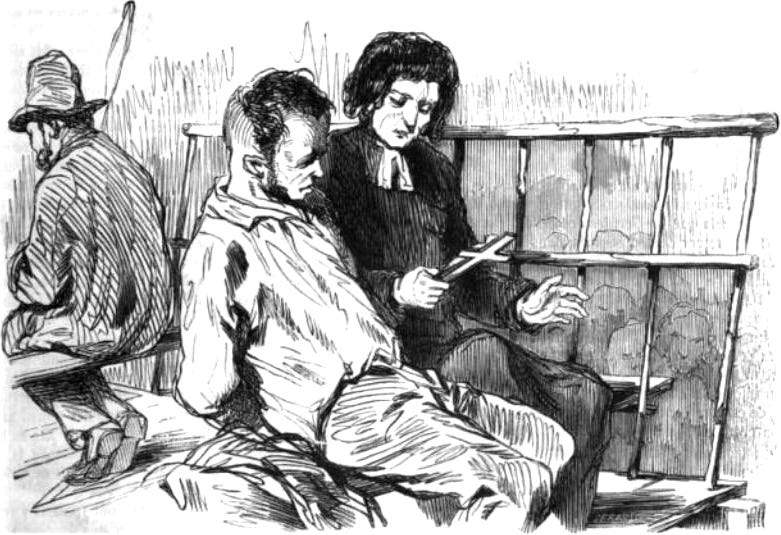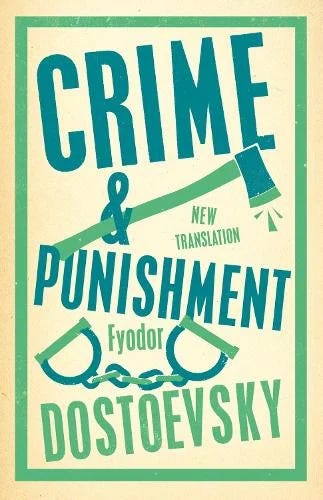Ilya Petrovich Is a Blockhead.
Crime and Punishment Week 13: Part Two, Chapter 6.

Welcome to Week 13 of my slow read of Crime and Punishment. This week’s chapter is Part Two, Chapter 6.
Please bookmark the homepage for the read-along. You’ll find links to everything you need as we read the novel together.
Request a Translation Comparison
Paid subscribers may request translation comparisons for anything that jumps out in whatever translation you’re reading.
Once requested, it will be added to the public translation comparison spreadsheet.
If you enjoy this content and want to help me keep it going, please consider a paid subscription.
Thank you. 🙏🏻
This week’s characters
Characters in this week’s chapter in the order that they are mentioned:
Raskolnikov • Zamyotov • Razumikhin
Part Two, Chapter 6 Synopsis
All quotations in this post are taken from Roger Cockrell’s translation of 2022, Alma Classics, © Roger Cockrell 2022
Raskolnikov leaves his room in a state of torment around eight o’clock in the evening as the sun’s going down. The heat is stifling and he looks terrible.
He had only one thing in mind: he had to put an end to all this — it had to be today, and it had to be done now, once and for all, otherwise he would not be going back to his room, because he didn’t want to go on living like that.
He stops to listen to an organ grinder’s accompanying a young girl who is singing and gives her five copecks. There follows a rather strange conversation with an old man. He passes by the location where he overheard the street traders with Lizaveta the night before the murder, but they’re not there. He sees a large group of people and feels ‘an unaccountable urge to talk to everyone.’ Is this his feeling better again? Is it the same desire for human connection that we discussed in Part one, chapter 1?
Dostoevsky describes a vivid nightlife scene around the Haymarket, with music, singing, brawling, drunkenness, groups of women talking. Raskolnikov is tempted to go into a tavern after hearing some singing coming from inside. A young prostitute propositions him.
"Where was it," thought Raskolnikov, as he moved on further, "where was it I once read about someone condemned to death who, an hour before he's due to die, says or thinks that, if he were forced to live somewhere on a high cliff, on some narrow little ledge with room only for him, surrounded by nothing but precipices, the ocean, everlasting darkness, isolation and storms, and were forced to remain standing there in that tiny little space for all his life, for a thousand years, for ever, it would be better to live like that than to die? Just to live, to live, to be alive! It wouldn't matter how just to live!..
This is taken from ideas developed by Victor Hugo in The Last Day of a Condemned Man (1829) and Notre-Dame de Paris (1831, first translated into Russian in Dostoevsky’s own journal, Vremya in 1862).
Raskolnikov goes into the Crystal Palace and asks for tea and the newspapers. He meets the police officer, Zamyotov. They have a weird conversation, with Raskolnikov’s ranting about what he’s reading in the papers. He seems to be taunting Zamyotov. Raskolnikov explains to him how he would have gone about cashing in the stolen lottery tickets that Zamyotov mentioned, then went on to explain what he would have done with the stolen goods from Alyona Ivanovna’s apartment, describing basically what he actually did do. At this point, he looks unwell, twitching and sweating:
The terrible word trembled on his lips, just like the bolt on that door. It was on the point of bursting out of him, just one second more and it would come out, he would say it!
“But what if it was me who killed the old woman and Lizaveta?” he asked suddenly – and he came to his senses.
The conversation ends and Raskolnikov leaves, bumping into Razumikhin on his way out. Raskolnikov is ‘shaking from a wild sensation that bordered on hysteria, combined with an element of almost unbearable euphoria.’ As he leaves, Zamyotov stays behind thinking and, finally, changes his mind on one particular point: “Ilya Petrovich is a blockhead!”
Razumikhin tells Raskolnikov he’s been hunting high and low for him. They have an argument and then Razumikhin invites Raskolnikov to his party at Pochinkov’s house that night. Raskolnikov leaves, and then we get a short point-of-view shift to Razumikhin as he regrets letting Raskolnikov go off on his own in such a state and goes after him, but is too late.
Raskolnikov stops on —ky Bridge and has a dizzy spell. He comes to, only to find a desperate-looking woman staring at him. She steps over the railing and jumps into the canal in a suicide attempt. A policeman jumps in and saves her. Raskolnikov goes through some inner monologue here and we get the feeling that he’s been thinking of ending it in a similar way. But it seems that now his depression has lifted and his energy has been replaced by apathy. He walks on and finds himself outside the apartment block where he committed the murder. He goes up the stairs and into the apartment. It’s being decorated. We’re treated to some of the conversation between the two decorators, about fashion magazines from abroad. He explains to the decorators that he wants to rent the apartment and then asks where the blood on the floor was. The decorators don’t seem to know about the murder. The caretaker gets involved and Raskolnikov’s behaviour becomes even more erratic. He goes out to the entrance, where two caretakers are standing with a woman, a man in a long coat and another person. One of the workmen explains Raskolnikov’s weird behaviour and they talk of taking him to the police station, but they surmise that he’s nothing but a con artist and they send him on his way.
He heads off and sees a crowd up ahead with flashing lights.
Thoughts
It feels like Raskolnikov wants to be caught. The psychological ‘punishment’ he’s enduring is too much to bear, and he’s not handling it well. Is he about to give the game away? Does Zamyotov already know and is just toying with Raskolnikov?
Translation Points
The cliff scene resonated with me in this chapter. In Garnett’s translation, it’s a high rock scene. Cockrell renders the passage as follows:
Intrigued, Raskolnikov looked at the woman who had just spoken. She was about thirty, with a pockmarked face, covered in bruises, and a swollen upper lip. She had made her point calmly and seriously.
Where was it, thought Raskolnikov, as he moved on further, "where was it I once read about someone condemned to death who, an hour before he's due to die, says or thinks that, if he were forced to live somewhere on a high cliff, on some narrow little ledge with room only for him, surrounded by nothing but precipices, the ocean, everlasting darkness, isolation and storms, and were forced to remain standing there in that tiny little space for all his life, for a thousand years, for ever, it would be better to live like that than to die? Just to live, to live, to be alive! It wouldn't matter how - just to live!...
How right he was! Oh Lord, how right!* Man is such a vile creature! And equally vile is the person who calls him that," he added a moment later.
The other seven translations are in the comparison spreadsheet.
Thank you for reading
Thank you for reading with me.
This book group is entirely funded by its readers. If you enjoy my posts, please consider a paid subscription to support me and this work.
Or if you’d rather just buy me a coffee, I’d be very grateful!





I like the way how on the one hand I think Raskolnikov should pay for his crime while on the other hand I find myself thinking 'No! No! Don't be so stupid!' when he's on the verge of revealing his guilt. I don't want him to be caught. Yes, Dostojevski is playing nicely with his readers. Raskolnikov is not even likeable and yet I identify with him. What also struck me in this chapter is the way he spells out how important life is to us, how we cling to it (the Hugo bit), whereas he himself murdered two women who wanted to live just as much - but he doesn't mention that. So far he hasn't really been thinking about what happened (or at least not that we readers know). Could this be a start?